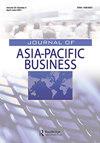Deglobalization: Economic and Political Challenges
Q3 Business, Management and Accounting
引用次数: 2
Abstract
During the last seventy years, a US-centric globalization following World War II flourished. Free market structures and policies nurtured the growth and advancements of global markets and improved the economic conditions of a large segment of the global population. In a US-based global American multinational system, US global 500 firms grew and flourished and helped the economic recovery of Europe, as well as Japan and South Korea, and aided other smaller Asian economies. The arrival of the Indian economy to the global marketplace lifted the 1.3 billion inhabitants of the Indian lower and middle classes. Furthermore, the Chinese economy with its equally large population, experienced much faster economic growth than that of India. China became the factory of the planet in our global village. Moreover, other state-owned multi national firms from other emerging economies arrived to the global economy and started to compete with US multinational enterprises. The structural deployment of assets and capabilities of multinational corporations whether in multinational formats or transnational formats led to global efficiencies and global economic growth and supported global links. The geocentric mind set of US corporate leaders and decision makers, while initially absent, became more evident to US global leaders and helped further the development of economic structures in emerging markets. The efficiency of the US multinational system led to economic growth not only in the United States but also across Asia-Pacific economies. This helped lead the arrival of the Chinese to global markets and the entry of China to the World Trade Organization (WTO), helped to reduce Chinese poverty, and fueled its GDP growth rate – a rate that ranged from 8 to 10% annually for over 3 decades. COVID-19 exacted and demanded a lockdown, not only in China and across the Asia-Pacific countries but in other countries and reduced GDP growth rates worldwide. Following that, the economic benefits of globalization were certainly put to question, and employees across the United States and elsewhere pointed out that globalization helped the winners and impoverished them (the workers). They also argued that the benefits of globalization accrued mostly to the few at the top of the economic pyramid. Today we have serious global economic challenges and a desire to disengage from the global economy behind a mind set that the global economy did not benefit the majority of the population in this global village that we are living in. The evident advantages of a multinational corporate vision such as scale and scope and technological growth and innovation, are now called into question. JOURNAL OF ASIA-PACIFIC BUSINESS 2022, VOL. 23, NO. 4, 273–276 https://doi.org/10.1080/10599231.2022.2145623去全球化:经济和政治挑战
在过去的70年里,二战后以美国为中心的全球化蓬勃发展。自由市场结构和政策促进了全球市场的增长和进步,并改善了全球大部分人口的经济状况。在以美国为基地的全球美国跨国体系下,美国世界500强企业蓬勃发展,帮助欧洲、日本和韩国经济复苏,并帮助其他较小的亚洲经济体。印度经济进入全球市场,提升了13亿印度中下层居民的生活水平。此外,拥有同样多人口的中国经济经历了比印度快得多的经济增长。在我们的地球村,中国成为了地球工厂。此外,其他新兴经济体的其他国有跨国公司也进入了全球经济,并开始与美国跨国企业竞争。跨国公司资产和能力的结构性部署,无论是以跨国形式还是以跨国形式,都促进了全球效率和全球经济增长,并支持了全球联系。美国企业领导人和决策者的地缘中心思维虽然最初并不存在,但对美国的全球领导人来说变得更加明显,并帮助推动了新兴市场经济结构的发展。美国跨国体系的效率不仅促进了美国的经济增长,也促进了整个亚太经济体的经济增长。这帮助中国走向了全球市场,加入了世界贸易组织(WTO),帮助中国减少了贫困,并推动了中国的GDP增长率——在30多年的时间里,每年的增长率在8%到10%之间。新冠肺炎疫情不仅在中国和亚太地区,而且在其他国家都要求和要求封锁,导致全球GDP增长率下降。在此之后,全球化的经济利益当然受到质疑,美国和其他地方的雇员指出,全球化帮助了赢家,使他们(工人)变得贫穷。他们还认为,全球化的好处主要集中在经济金字塔顶端的少数人身上。今天,我们面临着严峻的全球经济挑战,我们渴望脱离全球经济,但背后的思维模式是,全球经济并没有使我们生活在这个地球村的大多数人受益。跨国公司愿景的明显优势,如规模和范围以及技术增长和创新,现在受到质疑。《亚太商业杂志》2022年第23卷第1期。4,273 - 276 https://doi.org/10.1080/10599231.2022.2145623
本文章由计算机程序翻译,如有差异,请以英文原文为准。
求助全文
约1分钟内获得全文
求助全文
来源期刊

Journal of Asia-Pacific Business
Business, Management and Accounting-Business and International Management
CiteScore
2.50
自引率
0.00%
发文量
17
期刊介绍:
Present circumstances underscore the need to improve the understanding of conducting business with and within the Asia-Pacific countries. The Journal of Asia-Pacific Business™ provides a blend of cutting-edge knowledge and practical applications on business management and marketing strategy. In the Journal of Asia-Pacific Business™, you will find articles and feature sections that provide a pragmatic view of the business environment in this dynamic region. This essential resource offers readers a good blend of descriptive, conceptual, and theoretical articles dealing with current topics.
 求助内容:
求助内容: 应助结果提醒方式:
应助结果提醒方式:


